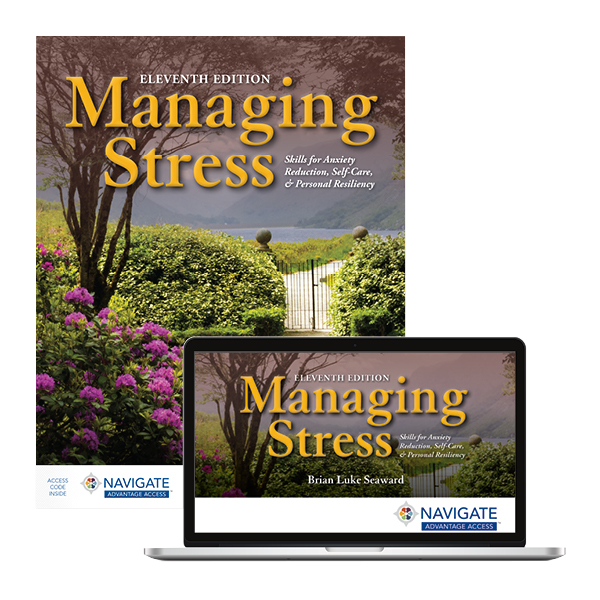Instructor: ‘Stress Management is a Skill that Needs to be Taught’

There is no denying that we are living through stressful times. So stressful in fact that new words have entered our lexicon: “FOMO,” and “Doomscrolling,” to name two. Managing stress has become a day-to-day burden for most of us.
Brian Luke Seaward has been teaching stress management in some capacity for more than four decades. While he is the authority on the acute stressors we face in today’s world, he is also a leading expert in how stress management should be taught in the classroom.
“First and foremost, stress management is a skills class,” he says in an interview with Jones & Bartlett Learning. “It’s a lot of theory, and a lot of information, but I live by the motto that says, ‘To know and not to do is not to know.’ You can know all the concepts of stress management, but if you don’t do them what good are they?”
Seaward has just finished the 11th edition of Managing Stress: Skills for Anxiety Reduction, Self-Care, and Personal Resiliency. In an interview with Jones & Bartlett Learning, he discusses the features of his updated text, which include brilliant new photography, a chapter called “Living in an Upside-Down World,” and the new tools instructors can use in class such as a collection of white-noise MP3s, flash cards, updated Power Point slides and more. Read on to learn Seaward’s approach to teaching this critical skill in today’s world.
Watch the interview here:
Seaward discusses how he saw a mental health crisis on the horizon in early 2020, as a novel pathogen called Covid-19 spread around the world with frightening speed.
“The biggest issues before Covid were isolation and alienation,” Seaward says. “Then we had this pandemic which basically put a magnifying glass on these two problems. I said, ‘This is like throwing gasoline onto the fire.’”
He uses this context to ground the new edition of Managing Stress. He says it’s not for the effect of doom and gloom, but it’s to set a new context for teachers and students that we are living through dramatically more stressful times than we were even a few years ago.
“It’s just to anchor in the dynamics of where we are today and how to deal with it,” he says.”
Teaching Stress Management is about Teaching Skills
Seaward’s energy is palpable, even through a computer screen. It’s clear that he is not only passionate about teaching stress management, but that he has conceptualized how stress management can and should be taught in the classroom. His courses are a mix of theory, history, and relaxation techniques such as one might find in a yoga class.
“I think it’s really important for instructors to take time to teach the skills,” he says. “Teach progressive muscle relaxation, teach autogenics, teach yoga if you can.”
Seaward says he brings in guest speakers to fill out his courses to teach yoga, tai chi and other stress management skills.
Today’s stressors are more than just societal problems such as climate change, incivility and living through the wake of a pandemic, however. There is a huge and increasing body of research on sleep and how a lack thereof is contributing to the mental health crisis Seaward refers to.
“Over half of Americans right now claim to not get a good night sleep on a regular basis,” he says. “That’s huge.”
Lack of sleep affects everything from driving to work productivity to relationships. Seaward included a chapter on sleep, and, again, how teaching the skills of stress management can lead to healthier sleep habits and better sleep overall.
To Learn Stress Management Skills, Teachers and Students Need Stress Management Tools
Seaward’s new edition includes much more than just words on pages. He decided to include recorded guided meditations as well as nature sounds mixed with white noise. He says instructors can use these in class, absolutely. But he is told that student’s parents use this for themselves long after their child is done with the class.
He believes in these techniques and tools, but he admits there is a little entertainment thrown into to the work.
“We live in an entertainment society,” he says. “You’ve got to have something which is engaging. All these ancillaries are meant to augment the student’s experience to learn the content.”
Beyond the MP3 collection, he’s included practice quizzes, a test bank, lesson plans, and the visuals. He’s incredibly proud of the visuals in this book, which he painstakingly chose to, you guessed it, reduce stress.
Seaward says that there is some physiology in his text as there should be when discussing a topic that is health adjacent. But he underscores that the key to teaching this material lies in the practice.
“Yeah, it’s important to know that how the hypothalamus secretes various hormones, that physiology is important don’t get me wrong,” he says. “However, if all you know how to do is recite back facts, that’s not going to help you in traffic, that’s not going to help you with a bank account that’s running low on funds, that’s not going to help you with anything.
“We need to actually apply these skills on a daily basis, just like brushing your teeth or taking a shower, we need to have good hygiene for stress,” he says.
Managing Stress: Skills for Anxiety Reduction, Self-Care, and Personal Resiliency 11th Edition
Managing Stress: Skills for Anxiety Reduction, Self-Care, and Personal Resiliency 11th Edition provides a comprehensive approach to stress management, honoring the balance and harmony of the mind, body, spirit, and emotions.
Request Your Review Copy